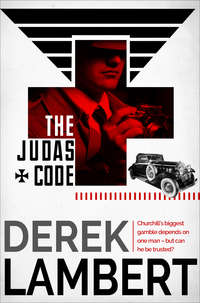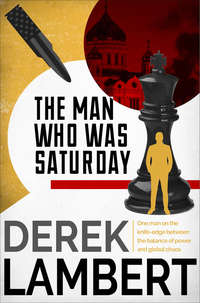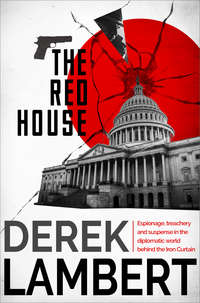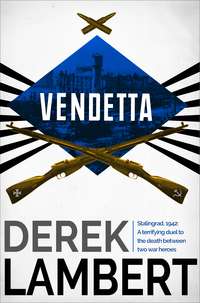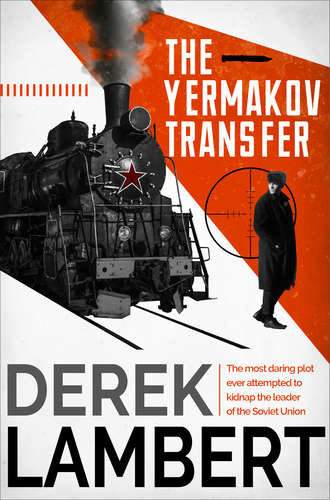
Полная версия
The Yermakov Transfer
For the first time since the Jewish sections of the Communist Party, the Yevsektsia, were disbanded in 1930, Soviet Jewry had in JAC an officially-sanctioned organisation. Its journal was called Unity and Lev Soliman’s parents were among its contributors.
JAC was, of course, another shooting star spluttering in the darkness of prejudice. The Jews thought that, by co-operating with the Soviets in defeating Hitler, they were also constructing a peaceful future in Russia. In 1943, when JAC emissaries Mikhoels and Feffer went on a tour of Jewish communities in the U.S.A., Britain, Canada and Mexico, Joseph Stalin personally wished them well.
Such was the hope of a new understanding between Russians and Jews that Zionist leaders even suggested a meeting between Chaim Weizmann and Stalin. Churchill was asked to get them together at Yalta in 1945; but Churchill turned down the idea: Churchill knew better.
All this time the Solimans worked joyously for the cause and the future of their son, Lev.
The Allies finally beat the Nazis and the Soviet attitude towards JAC began to cool: the Black Years of Stalin’s Jewish purges were beginning. On January 13, 1948, Solomon Mikhoels, director of the Moscow Yiddish State Theatre and one of the two emissaries who had spread the word to the world in 1943, was murdered in Minsk. He was a personality and he was emerging as the leader of Russian Jewry.
The murder was followed by the liquidation of the Committee. Lev Soliman’s parents were charged under Articles 58/10, part 2, to ten years in strict regime camps on charges of “belonging to a Jewish nationalist organisation and spreading nationalist propaganda”. Lev was looked after by the state.
When Kruschev came to power the Solimans were pardoned and the family was reunited in Moscow. Lev continued his education, winning a place at Moscow University.
But JAC had left its scars on him. He despised naïveté, he trusted no one. Organised protest served a function, but to Lev, it had a whine about it, a recognition of Soviet supremacy. Caution, caution. Lev Soliman spat on caution.
He gathered around him half a dozen young fanatics who believed that violence was the only honourable solution. Like other extremists throughout the world they didn’t necessarily represent the beliefs of those they fought for. But this didn’t bother them; they regarded the patient resolve of Soviet Zionists as weakness and they operated clandestinely treating both orthodox Zionists and Russians as the enemy.
This was the nucleus of subversion to which Lev Soliman introduced Viktor Pavlov. The nucleus of which Pavlov was soon to become leader.
* * *
In the autumn of 1962 Pavlov began to construct his cover. He already possessed Soviet nationality but he had to establish impeccable references. The secret police knew about his father; therefore they knew there was at least a strain of Jewish blood in him. So, with the approval of the K.G.B., he worked with the Jewish underground movement publishing samizdat newspapers, smuggling subversive literature out of the country – and informing on his colleagues.
Within a year he was an established agent provocateur in the student movement. He won a brilliant degree in mathematics and went to Leningrad to study computers to make himself invaluable to a country backward in such refinements.
There he met a girl who, at the age of eighteen, had been made a Heroine of the Soviet Union. Viktor Pavlov welcomed her as the means to make his cover unassailable.
Anna Petrovna was the spirit of Russia, the rose of Siberia. Her bravery was the inspiration for a legion of Komsomols to head east, to built cities in the frost, to tap the hostile territories of their wealth.
As a student geologist, Anna Petrovna had flown to Arctic Siberia in an eight-seater AN-2 with two young men. To her, the snow-covered taiga of the north, inhabited by reindeer and primitive tribesmen was a storehouse of precious stones – emeralds, amethysts, topaz, jasper, sapphires, garnets. But it was diamonds that fascinated her.
With a magnifying glass in one hand, she crawled beside a frozen river for two months, averaging a mile a day, searching for kimberlite, the blue-grey earth that advertises the presence of diamonds.
After the first month she couldn’t stand up straight. Towards the end of the second, when the wilderness was briefly thawing and she was paddling on raw knees in slush, she was on the point of giving up. One day she reached a spine of hills and gazed down on a plain patched with snow beneath a mauve haze. Idly, she stooped and picked up a handful of mud, straightening up painfully. The mud was blue-grey.
For a week she and the two young men dug. One bright morning they gazed down the shaft and saw a shiny blue light at the bottom. It was the first diamond chimney in the area and they called it “Blue Flash”.
Anna Petrovna and Viktor Pavlov met one evening at the White Nights club in Leningrad and fell in love; she unreservedly, he deeply and passionately but with a sliver of calculation in his soul, the chip of ice that never melted.
The marriage was popular. Such a fusion of talent; such a union of Russian beauty – he with his strong brown face and cap of glossy black hair, she the Siberian with her cool, glittering good looks – the sort of face that beckons from Aeroflot brochures. The wedding was honoured with a photograph in Komsomolskaya Pravda and a story that speculated on the handsome geniuses the couple would produce.
* * *
They spent their honeymoon in Siberia beside Lake Baikal – the Holy Sea, the Northern Sea, the Rich Sea. So right for their union with all its bizarre superlatives. Here Genghis Khan once camped in the heart of the territory of Marco Polo, Strogonoff, Yermak, Godunov, Kuchum. The deepest lake in the world, 400 miles long and 50 miles wide in places, filled by 336 rivers and emptied by only one, the Angara. Populated by fresh-water seals, omul and bright green sponges with which peasants clean their pots. Covered in winter by nine-foot deep ice which splits with a crack like thunder, tormented by storms and earthquakes which once, long ago, broke up the Gypsy Steppe on the eastern shore killing 1,300 people in the fissures, geysers and flood waters.
But today the waters were becalmed with floating islands of blossom like reflections of clouds and the only awesome sight was a ruff of white mountains in the distance.
They gazed upon it all from a rumpled bed in a guest house at Listvyanka. He very dark and hirsute beside her white body.
“Viktor Pavlov,” she said, “I love you. I’ll always love you.
“And I love you, Anna Petrovna, Heroine of the Soviet Union.”
“Does that bother you?” She stroked his chest, his flat belly, his sex.
“No, why should it?”
“It’s bothered other men.…”
“To hell with other men.”
“It upset them that I was made a heroine. That I crawled on my hands and knees for two months like some crazy cleaning woman.”
“It doesn’t bother me. They must have been very weak men.”
“They were. Stupid men. You’re the strongest man I’ve ever known. I felt your strength the first time we met.” She kissed him. “Like some inner force. Like a secret.”
“We all have secrets,” he said. “You do – your lovers, your deepest thoughts. Even what you’re thinking when you look out there.” He pointed at a bed of pink blossom drifting past the window. “We even keep secrets from ourselves.”
She shook her head so that her soft fair hair fell across her face. “I haven’t any secrets. Just the silly ambitions of any girl. A few meaningless men before the right one, the only one.” She pressed herself against him. “What’s your secret, Viktor Pavlov?”
He didn’t answer.
She held his arms down on the bed, staring at him with her blue eyes in which he could see sunlight and snow. “You frightened me a little.”
“I can’t imagine you being frightened of anyone.”
“Promise me you’ll always be faithful?” She thought about it. “Even when you go with other women – you’ll be faithful?”
“I’ll always be faithful,” he lied.
“And there will be other women?”
“No other women,” he told her, because that wasn’t the nature of his infidelity. I shall betray everything you cherish, he thought. He pressed his face against her firm white breasts.
“I’m glad,” she said, stroking his hair. “I was trying to be sophisticated. Men going with women and staying faithful to their wives. I wouldn’t like that.”
“Only you,” he said.
“We’ll go well together, you and I. We love the same things.”
“Ah yes,” he said. “The same things.” Thinking that in a way it was true.
“Viktor?”
“Yes?”
“I’m right, aren’t I?”
He kissed her, fondling her breasts, and, when he was hard again, made love with desperation.
When they were finished he glanced out of the window and saw a fishing boat drifting by, a breeze catching its sail. There was an illusory permanency about that moment and he always remembered it.
* * *
From 1962–67 Viktor Pavlov consolidated his position. He worked hard and became Russia’s leading authority on computers. He was given an apartment on Kutuzovsky Prospect in Moscow fit for a hero and heroine.
Before they left Leningrad he found, hidden in a bookshop opposite the Gostiny Dvor, a slim booklet printed by the old Yiddish publishers, Der Emes, containing the Hebrew alphabet. He kept it locked in his desk; later he obtained a Hebrew textbook.
But it was a period of frustration. There were now twelve members of his group of revolutionaries calling themselves the Zealots. But, short of planting bombs and reviving the rabid-Semitism of the Black Years, they found nothing positive to do. Pavlov raged inwardly. Caution, caution! His marriage suffered and Anna, not understanding, not knowing that he was a Jew, found consolation in her work taking her to the jewelled wastes of Siberia.
It wasn’t until 1967 when, in six days, the Israelis routed the Arabs, and the desire to settle in the Promised Land flamed across the Soviet Union, that the ultimate plan began to take shape in the minds of Viktor Pavlov and the Zealots.
* * *
The Jews were on the rampage bombarding authority with appeals. The Presidium of the U.S.S.R. Supreme Soviet, the Secretary-General of the United Nations, the International Red Cross, the Knesset, the Commission on Human Rights, UNO, premiers, editors, enemies, friends.
Viktor Pavlov who had studied the fluctuating history of Zionism in Russia regarded their efforts with good-natured cynicism.
The movement pre-dated world Zionism. In 1884, fourteen Jews from Kharkov landed in Jaffa and, even before World War I, most of the forty settlements in Palestine were founded by Russian Jewry.
When the Bolsheviks came to power in October, 1917, the movement seethed with excitement. But, as always, the excitement was short-lived. On September 1, 1919, the Cheka occupied the offices of the Zionist Central Committee in Leningrad, confiscated all documents and 120,000 roubles, arrested Committee members and banned the Chronicle of Jewish Life. Next day Zionist leaders were arrested in Moscow.
The harassment subsequently took a zig-zag course. Imprisoned Jews were released; others were arrested; seventy-five delegates to a convention in Moscow were accused of counter-revolutionary activities – peroxylin slabs of guncotton were said to have been found in the Zionist Central Committee offices – and thrown into Butirki jail.
In 1921 the pressure eased. In 1922 it stiffened again. Fifty-one members of the popular wing of the Zionists were arrested and accused of seeking help from reactionary elements ranging from Lloyd-George to the Pope.
Arrests continued on a vast scale. The Russians wanted to get rid of a few expendable trouble-makers and, in return for statements that their activities were anti-Soviet, some were allowed to go to Palestine.
By 1928 thousands of Jews were in prisons and camps. They were beaten, tortured, starved, thrown into solitary confinement. By 1929 all the Hechalutz collective farms preparing Jews for conditions in Palestine had been liquidated. Between 1925–26, 21,157 Jews managed to get out of Russia: between 1931–36, only 1,848 made it to Palestine.
In 1934 the last outpost of underground Zionism, the Moscow Central Executive Committee of Tzeirei Zion and the Union of Zionist Youth, was destroyed. Its members were jailed and the Government presumed Zionism dead.
It was reincarnated at the beginning of World War II when the Soviet Union annexed tracts of Eastern Europe, increasing its population by two million Jews, predominantly Zionist. Hundreds of thousands of them were promptly sent to forced labour camps.
In June, 1941, the Germans invaded Russia, slaughtering any Jews they encountered, and, years later, the Russians built a playground over the site of one of their massacres at Babi Yar.
Then came the formation of JAC. Hope followed inevitably by disillusion.
After the war Stalin supported the creation of the State of Israel because he thought it heralded the break-up of British power in the Middle East; Russia was one of the first powers to recognise the new country in 1948. But, after Stalin’s death in 1953, the policy changed: the Americans held the influence in Israel and the Soviet Union decided to undermine Western power by supporting the Arabs.
Inside Russia, Krushchev turned on the dead dictator Stalin, denouncing his butchery. Viktor Pavlov remembered the impact of the Khrushchev speech in his schoolroom. He also remembered that it made no mention of Stalin’s persecution of the Jews.
During Krushchev’s reign the terror inside the Soviet Union relaxed. When he was deposed and Leonid Brezhnev and Alexei Kosygin finally came to power, Premier Kosygin announced in Paris on December 3, 1966, that “as far as the reunification of families is concerned, if some families wish to meet or if they want to leave the Soviet Union, the road is open to them and there is no problem in this.…” On December 5 his statement was published in Izvestia.
It launched a flood of applications for exit visas to the OVIR.
Between June 5–11, 1967, Israel smashed the Russian-equipped armies of Egypt, Syria and Jordan and on June 10 the Soviet Union broke diplomatic relations with Israel; the Soviet attitude to Jewish emigration hardened once more.
On August 5 Viktor Pavlov chanced upon a copy of Sovietskaya Latvia in which Zionism was likened to the Mafia. He liked the comparison.
* * *
The plot assembled in several phases. In 1967 it was merely concerned with getting the Jews out of Russia. At a party in 1969, one year before the Leningrad skyjack trial, it assumed a more definite shape.
The party was at Pavlov’s Moscow apartment on Kutuzovsky in the complex of blocks where foreign diplomats and journalists lived, guarded at the gates by militiamen and bugged by the K.G.B. Many residents regarded the hidden microphones as a joke; about two committed suicide every year. The Pavlov’s got the apartment because the complex was one of the best in town and it was salutory for foreigners to see the pride of Soviet man and womanhood crossing the shabby courtyard.
The Pavlovs’ guests that evening included scientists, mathematicians, geologists, Yevtushenko the poet, a ballerina from the Bolshoi and some of the staff of the prestige magazine Novy Mir.
Pavlov was talking to Professor David Gopnik, associate member, Ukranian Academy of Sciences, department chief, Donetsk Computing Centre. They talked in symbols and electrical pulses, boring other guests so that finally they were isolated in a corner of the lounge.
Gopnik, a thin, bespectacled man with a low forehead contradicting popular beliefs about intelligence, said casually: “I tried to get out again today.”
Pavlov looked at him with surprise. “Get out of where?”
Gopnik looked equally surprised. “Out of Russia, of course. They turned me down again.”
“I didn’t realise you were a Jew.”
Gopnik grinned. “Feed me back through a computer and you’d end up with Moses.” He glanced around the other guests, voluble with Soviet champagne and Stolichnya vodka bought at the dollar shop on the first floor of the block. “And I’m not the only one here. A few of your guests are the product of mixed marriages. One or two have changed their names. Comrade Goldstein doesn’t get very far in Soviet society.”
“You’ve done all right,” Pavlov commented.
“Only because they need my brains.” Gopnik took a sliver of toast smeared with caviar and a glass of champagne from a tray carried by Pavlov’s hired waitress. “My brains are my misfortune. Without them I might be in Jerusalem today.” He stared at Pavlov knowingly. “Is there, by any chance, any Jewish blood in you, Comrade Pavlov?”
Pavlov hadn’t been asked the direct question since his student days. To deny it was treachery, blasphemy; like betraying your mother to the secret police. To confirm it was sticking a knife in the cover he had prepared for seven years. The K.G.B. knew of the diluted Jewish strain through his father, nothing more. As far as they were concerned he had proved himself an exemplary Soviet citizen willing to rat on any Zionist.
Pavlov said: “Would you like to see my passport?”
Gopnik said: “That won’t be necessary.” He licked some black spawn from his fingers. “It was very brave of you to invite a Jew to such a distinguished gathering.” He signalled to the waitress to bring him more champagne. “But, of course, you and your wife are somewhat privileged. And, of course, you didn’t know I was a Jew.”
His voice was loud with alcohol; Pavlov glanced around the lounge, with its contemporary furniture, its glassware from Czechoslovakia, its new TV set, to see if anyone was listening. “Perhaps we could meet tomorrow?” he suggested.
“Why? So that you can tell me the truth without fear of being overheard?”
Which was precisely what Pavlov had in mind. “Just to have a chat,” he said, listening to his own duplicity.
“What is there to talk about?”
“Perhaps I can help you.”
“And perhaps you can put the K.G.B. on to me.”
Pavlov spoke quietly and intensely wanting to grip the man by his lapels. “The K.G.B. already know everything about you. They’ve interrogated you, haven’t they?”
Gopnik shrugged. “Perhaps you might like to tell them that I’ve been spreading seditious propaganda.”
“Listen,” Pavlov said. “Meet me tomorrow. I promise I’ll tell no one.”
“The promise,” Gopnik asked, “of a Russian or a Jew?”
“A promise,” Pavlov said.
Gopnik looked at him uncertainly, swaying slightly. “Where?”
Pavlov smiled at last. “Outside Lenin’s tomb. Where else?”
Anna came across and took Viktor’s arm. She looked pale and elegant in a black cocktail dress bought in London during a geological conference. “Come and join the party,” she said. “Enough computerised conversation.” To Viktor she whispered: “You are being very rude, darling.” She led him away to a group of scientists and Pavlov wondered if any of them were Jews in disguise.
* * *
This phase of the plan, inspired unknowingly by David Gopnik, developed brilliantly during the evening and Pavlov became so elated that he hardly heard what anyone was saying. The guests put it down to vodka which was probably a contributory factor.
“Don’t you think you’ve had enough,” his wife whispered as he tossed back a glass of firewater. “You’re getting very flushed.”
In reply he took another glass from the tray. Anna stalked angrily across the room to join Yevtushenko’s audience.
Pavlov’s first thought was: If I could get the top Jewish brains to emigrate it would hit the Russians hard.
He oiled the thought with more vodka.
Then he thought: Why generalise? Why not deprive the Soviet Union of the nucleus of one branch of science?
He was talking to an assistant editor of Novy Mir who, with a Molotov cocktail of champagne and vodka under his belt, was giving his personal opinion of the literary merits of Daniel and Synyavsky. “Just my opinion,” the editor said, looking furtively around. “Just between you and me. Understand?” He prodded Pavlov in the ribs.
“Of course,” Pavlov said conspiratorially. “I understand.”
Supposing I could get all the Jewish nuclear physicists to emigrate?
Adrenalin and vodka raced in his veins.
“… and that’s my opinion of Pasternak.” The Novy Mir editor said challengingly.
Pavlov said: “I agree.” With what? “I’ve been to his grave. No one looks after it. Did you know that?”
The editor looked bewildered. “Fancy that,” he said.
What if I persuaded a team of Jewish nuclear physicists capable of making a hydrogen bomb to emigrate?
“Solzhenitzyn,” the editor whispered. “A great writer.”
Pavlov countered with: “What about Kuznetsov?”
But, of course, the Soviets would never grant nuclear physicists exit visas. The idea was crazy. Unless.…
The editor was still deliberating over Kuznetsov. His brain worked laboriously and his tongue was thick in his mouth. “Ah,” he managed, “Kuznetsov, a fine writer but …”
Unless I found a way to force their hand.
His mind raced with the possibilities; but it got nowhere, not that night.
The Novy Mir editor abandoned the enigma Kuznetsov. The flushed guests began to leave.
Tomorrow, Pavlov thought as he shook their hands automatically, I must reaffirm my faith with David Gopnik.
* * *
His wife was lying in bed waiting for him. She wore a pink cotton nightdress. She looked warm and sleepy and unheroic.
“Viktor,” she said, as he undressed clumsily, “you were very bad tonight.”
“I know.”
“I’ve never seen you drunk before.”
He fumbled with his shoelaces, sitting on the edge of the bed. “It doesn’t often happen.”
“Why tonight? Was there a reason?”
“Not particularly. It doesn’t matter. Everyone else was drunk.”
He was naked, searching for his pyjamas. “They’re under the pillow,” she told him. He climbed into bed, his legs heavy, and gazed at the spinning ceiling.
“Who was that man you were talking to?”
“Which man?”
“The man you were stuck with in the corner for nearly an hour.”
“His name’s Gopnik. He’s one of the best men on computers in the Soviet Union.” He closed his eyes but even the darkness lurched.
“Is he Jewish?”
He opened his eyes. “What if he is?”
She looked surprised. “Nothing. I just wondered if he was.”
He knew the drink was talking and he knew he must stop it. “You made it sound as if he was a leper.”
She was bewildered. “I didn’t mean to. I’ve nothing against the Jews. I just don’t understand why they want to leave Russia.”
The answers struggled to escape, but he fought them. He said: “Because they believe they have a land of their own.”
“But they’re more Russian than they’re Jewish.”
He wanted to shout “I’m a Jew” and see the shock on her face. “Not now,” he managed. “I’m too tired. Too drunk.” He reached for her. “Turn the other way. The smell of vodka must be foul.”
Obediently, she turned and he slipped his arms around her. She felt warm and soft, still smelling faintly of perfume. He cupped one breast in his hand. We’re good together, he thought. And yet I have to destroy our happiness.
“Viktor,” she said, “I’m frightened.”
But he was asleep.
* * *
The sky was pale blue this October morning with the sunlight finding the gold cupolas of the Kremlin and the sapphires in the frost on the cobblestones of Red Square.
The eternal queue was shuffling into the tomb, made of slabs of polished dark-red porphyry and black granite, to pay homage to Vladimir Ilyich Lenin, the man who gave them what they had.



